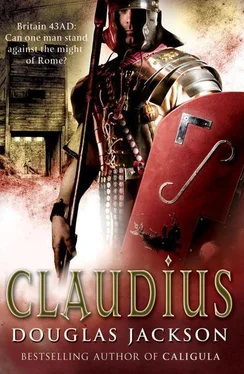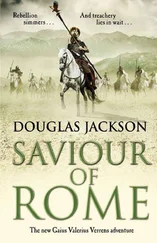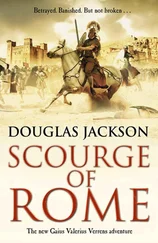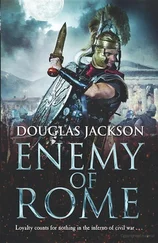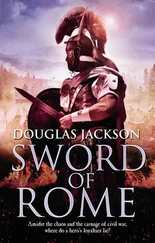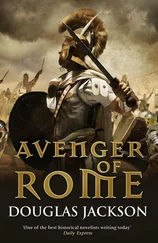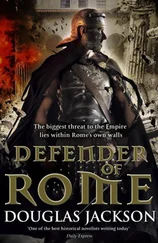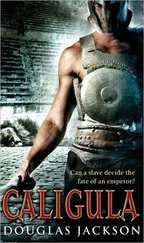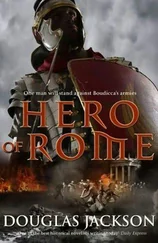Douglas Jackson - Claudius
Здесь есть возможность читать онлайн «Douglas Jackson - Claudius» весь текст электронной книги совершенно бесплатно (целиком полную версию без сокращений). В некоторых случаях можно слушать аудио, скачать через торрент в формате fb2 и присутствует краткое содержание. Жанр: Исторические приключения, на английском языке. Описание произведения, (предисловие) а так же отзывы посетителей доступны на портале библиотеки ЛибКат.
- Название:Claudius
- Автор:
- Жанр:
- Год:неизвестен
- ISBN:нет данных
- Рейтинг книги:4 / 5. Голосов: 1
-
Избранное:Добавить в избранное
- Отзывы:
-
Ваша оценка:
- 80
- 1
- 2
- 3
- 4
- 5
Claudius: краткое содержание, описание и аннотация
Предлагаем к чтению аннотацию, описание, краткое содержание или предисловие (зависит от того, что написал сам автор книги «Claudius»). Если вы не нашли необходимую информацию о книге — напишите в комментариях, мы постараемся отыскать её.
Claudius — читать онлайн бесплатно полную книгу (весь текст) целиком
Ниже представлен текст книги, разбитый по страницам. Система сохранения места последней прочитанной страницы, позволяет с удобством читать онлайн бесплатно книгу «Claudius», без необходимости каждый раз заново искать на чём Вы остановились. Поставьте закладку, и сможете в любой момент перейти на страницу, на которой закончили чтение.
Интервал:
Закладка:
Douglas Jackson
Claudius
Prologue
Britain AD 43
The scarlet of their tunics spread across the land like a bloodstain.
From his position on the crest of the hilltop he could see the tight, disciplined column moving steadily through the trees. He tried to gauge their numbers. Thousands certainly, perhaps as many as ten thousand. And these were only the advance guard.
His spies had given warning of their coming but he had travelled days beyond his own frontiers to see for himself. The legions of Rome. They had been here once before, when his father was still a boy and Julius Caesar led them across the sea, but they had soon left, laden with gold and hostages. Some primal instinct told him that this time they were here to stay. The warriors of Britain had long forgotten the legions’ power and their fearsome potential, but he had remembered the old tales — and learned. Any refugee from Gaul knew he would receive a welcome among the Catuvellauni, and it was the way of the Catuvellauni chief to question such refugees, gently, about the threat that had driven them from their lands. Now he could see that threat with his own eyes and he felt an unfamiliar stirring low in his belly. So this was fear?
‘Lord? It is time.’
He looked over his shoulder to where his escort waited, hidden below the skyline. Ballan was right. If they stayed longer they could be trapped by the auxiliary cavalry which undoubtedly accompanied this force. But his eyes were drawn back to the marching column and the occasional glint of sun on burnished armour. In the serene quiet of the morning he could hear the faint notes of horns. Even at this distance it sounded alien. Aggressive.
‘Lord? Caratacus?’ Ballan’s voice was louder and more urgent. He was pointing to a saddle between two hills about a mile away, where a dozen small specks had just come into view. Horsemen. Another few minutes and they would be cut off.
‘Go,’ he shouted, running down the slope and vaulting on to his pony. Caratacus, king of the Catuvellauni, rode north to prepare his people for war.
I
Rufus felt soft lips caress his cheek, barely disturbing the three-day stubble. He had been asleep for only a few hours, except that the chill from the damp earth seeping into his bones meant it hadn’t been real sleep, more a dozing just beneath the surface of waking. Not sleep, but at least rest, and he needed rest after a long day on the march. For a moment he resented the attention, but he had dreamed so long of a woman’s touch, a woman’s tenderness; of hair the colour of spun gold and the texture of silk… He opened his eyes and looked lovingly into two hairy nostrils.
‘Bersheba,’ he groaned, pushing away the long, sinuous trunk that nuzzled his face. ‘It can’t be time to feed you already.’ He turned over and pulled his cloak closer around him, but his tormentor returned, plucking insistently at the heavy cloth. He sighed and sat up. He might as well give in now.
She was standing over him, and he could just discern the faint out-line of her massive bulk against the first hint of dawn that painted the sky a cadaverous, purple-bruised grey, the faint light reflecting liquid brown eyes filled with timeless wisdom. Bersheba had been his charge for almost seven years now, first under the psychotic Caligula — four terrible years he wished he could erase from his memory — and latterly in the more benevolent service of his successor, Tiberius Claudius Drusus Nero Germanicus. The Emperor’s elephant. And why, he asked himself for the hundredth time, are the Emperor’s elephant and her faithful slave stranded in this strange and dangerous land when the Emperor himself is a thousand long miles away in Rome?
He struggled to his feet and walked to the bullock cart to collect Bersheba’s feed and the little red apples she loved. Gaius and Britte were still asleep among the hay. He smiled down at his son and listened to the soft, regular breathing with a pleasure only a father could know. Gaius was tucked in close to the big slave girl who had been his wet nurse since his mother’s death at the hands of the man the world believed was also Caligula’s killer. Rufus was one of only two people left alive who knew the true story and that was the way he intended it to stay. In a few minutes Britte would rise and prepare the oats for their only proper meal between now and nightfall. Within the hour, they would harness the bullock cart and march another twelve miles.
It had been like this for a week. A relentless trudge across a rolling landscape of forest and downland as the soldiers of four legions sought to bring the tribes of Britain to battle. The whole army, forty thousand men from the furthest corners of the Empire, could sense their general’s frustration. Aulus Plautius Silvanus had promised his Emperor a swift victory, but all he had to show for his efforts were a few burned-out huts and the heads of a dozen British warriors taken in the endless, futile skirmishes that hampered his progress. Rufus gave thanks he was positioned with the baggage train of the Second Augusta, in the centre of the miles-long Roman column, and unlikely to be involved in any fighting. He had warned Narcissus that Bersheba wasn’t meant for war. Why had he trusted that scheming Greek?
The unexpected call to arms had come two months earlier, in the sheltered little park by Bersheba’s barn on the Palatine Hill. It was the day he’d met Claudius’s freedman when Narcissus had returned from the coast of Gaul, where Plautius had gathered his forces for the invasion of Britain. The balmy days of April had given way to the hard-edged heat of May, and the Mediterranean sun bounced off bone-hard ground and radiated from the gleaming white marble of the great Corinthian-columned palaces. Both men’s lives had changed markedly since Caligula’s death. Rufus was still a slave, but one who held an honoured position in the imperial household. Narcissus was the Emperor Claudius’s trusted adviser and wielded the kind of power only granted to potentates. But Rufus knew he tired of the constant demands on him as Claudius’s eyes and ears. Tall and bald as a pullet’s egg, the ageless Greek looked thinner and more careworn, but his eyes were the same deep azure blue and had lost none of their hypnotic intelligence.
‘I must be too many people now, Rufus, far too many. Negotiator, diplomat, counsellor and enforcer. All things to all men,’ he had complained soon after the Emperor inherited the throne following his predecessor’s untimely, but well-merited, death. ‘Life was easier with Caligula. At least then all I had to worry about was staying alive.’
Claudius had honoured Plautius, the irascible governor of Pannonia, with command of the invasion because he was one of the few military commanders he trusted. Aulus Plautius was related by marriage to the Emperor and owed his position to that bond. He was renowned as a disciplinarian and legendary for the savagery with which he had put down the insurrections of the mountain tribes under his rule. The soldiers he led were the finest the Empire could provide. His shock troops were the elite Twentieth legion, five thousand battle-hardened legionaries who had learned their trade on the upper Rhine penning the German hordes east of the river. The Second Augusta and Fourteenth Gemina had joined them on the march from their bases further upriver. Ninth Hispana travelled furthest, from the upper reaches of the Danube, where they had been headquartered for almost thirty years. The four legions were reinforced by auxiliary units hand-picked for their fighting qualities: cavalrymen from Germany, Thrace and Gaul, tough little Syrian bowmen gifted by their king, and Batavian light infantry who could swim like otters. It was a mighty force. But there was one problem.
Читать дальшеИнтервал:
Закладка:
Похожие книги на «Claudius»
Представляем Вашему вниманию похожие книги на «Claudius» списком для выбора. Мы отобрали схожую по названию и смыслу литературу в надежде предоставить читателям больше вариантов отыскать новые, интересные, ещё непрочитанные произведения.
Обсуждение, отзывы о книге «Claudius» и просто собственные мнения читателей. Оставьте ваши комментарии, напишите, что Вы думаете о произведении, его смысле или главных героях. Укажите что конкретно понравилось, а что нет, и почему Вы так считаете.
